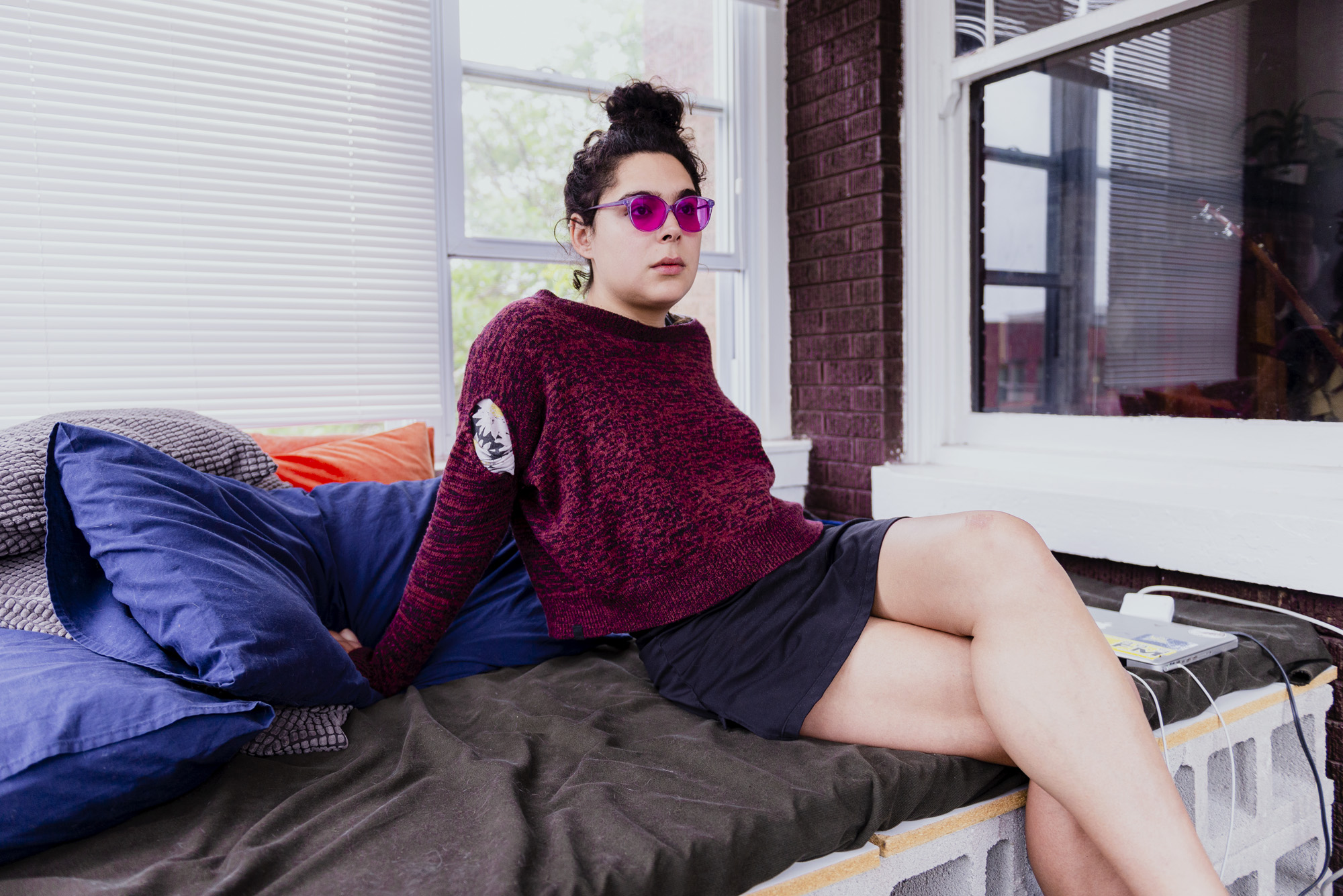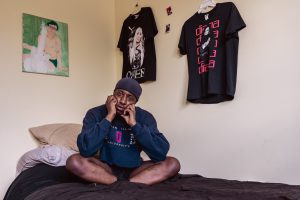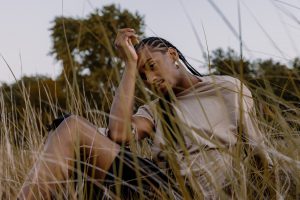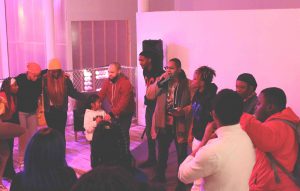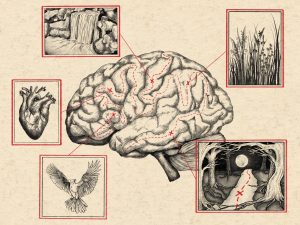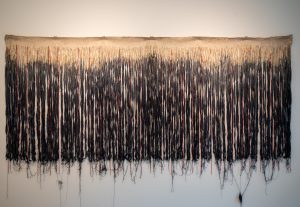DJing is a curious art form and rarely discussed as one. It is rarely discussed at all, except by other DJs in industry publications; what is there to say that can’t be expressed more vigorously on the dancefloor? If you’re talking, you’re not dancing, and you’re probably standing in the way of people trying to dance. Is it art? It’s entertainment, it’s a trade, it’s a party. I hear André Leon Talley in the documentary “Catwalk” wrinkling his nose at a parallel question about that other commercial art form: “No, no, no. Is fashion art? No! Fashion is hard work, gritty; it’s not glamorous”—the question is an embarrassment to both art and fashion (or DJing).
To consider the question at all means that the answer is at least “sometimes.” DJing is work in the realm of aesthetic experience; it is a discipline with a touch of wonder and mystery and creative talent. DJs hear what others don’t, they surprise us with a blend, they tell a story, they improvise, they observe the energy of a room in order to transform it; they work with field recordings, sound archives, and performance. But it’s a moral question, too: does it have an aura, does it do the sacred creative work of imagination, of memory, of liberation?
There’s no point to proving that DJing is an art, unless doing so adds to our understanding in some way. So, we talked. With DJs Ariel Zetina, Miss Twink USA (Del Hale) and Morenxxx (Jesús Hilario Reyes). I asked about what drew them to DJing, the decisions that factor in selecting and sequencing tracks, and their research process. Those questions turned into conversations about memory, pop culture, narrative form, sonic dominance, queer life, diaspora, history, and ritual. The three DJs draw on practices of performance, theater, poetry, and sound art. They incorporate field recordings, sound archives, memes, reality TV into the mix. They articulate time and space: a Beyoncé sample over an ‘80s house track, a field recording from Puerto Rico played over a UK club track in Chicago, a Brazilian baile funk song blended into Detroit techno.
Accompanying the written Q&As is a mixtape, “Art of DJing: House of Zetina,” that samples the audio from our interviews––an experiment in the form of the DJ mix, in using the techniques of DJing and music production to collage a conversation.

Ariel Zetina is DJ, producer, poet, and theater maker from Florida, based in Chicago. She’s a resident DJ of Smartbar, where she organizes the Diamond Formation series. She is on roster of the booking agency and DJ collective Discwoman and recently released her E.P. Organism on the Majía label.
This interview has been edited for length and clarity. Ariel Zetina uses she/her pronouns.
Sasha Tycko: How did you start Djing?
Ariel Zetina: I originally was doing performance art with a group called Witch Hazel, which was me, and then this artist Imp Queen, and this other artist Deven [Casey]. We were all coming from a theater background and were frustrated with the form, wanting to do stuff like throwing paint on our bodies. So we were making these sort of operatic, theatrical performances that would use a lot of electronic music…And then I basically got to a point where I was selecting a bunch of music and getting frustrated that it wasn’t exactly what I needed it to be. So I taught myself GarageBand and started producing from there. And that led me into DJing, combined with going out—I was going out a bunch at the time. I think I was always like, “I want to be a DJ,” but it just never felt possible for me at that time when I was first going out. But it was really the performance art thing that got me into it, and I was DJing more and more and realizing that I prefer that for my practice.
ST: What was your first gig?
AZ: My first gig was––it’s funny, because I don’t think the promoter even knew it was my first gig. I was like, “I DJ!” [Laughs] It was at Berlin. We got that gig from a performance art thing, too. My performance group and I did this performance at Berlin where we had bubble water guns and we did some fish themed event, and they wanted to do a whole party after that. So I ended up curating me and two of my friends who are DJs, but it was my first gig—no one knew. I sort of had a gig before that. I basically put myself in a DJ position at a performance, it was like a full-length thing at the DFBRL8R, maybe a month before that. But it felt different because it was a set of 10 songs for a performance, so I feel like it actually doesn’t capture what DJing actually is; it was more of a presentation. So, yeah, I consider the Berlin one as my first gig, this fish-themed thing where everyone was wearing swimsuits. It was really cute.
ST: Like a pool party! In my experience, DJing is really intimidating—the technology, what DJing even is, is a little mysterious. What was your process of learning the actual technology and techniques of DJing?
AZ: I don’t think I’ve ever been asked that question before. Yeah, funny story: I was booked to DJ at the Observatory and it was a mixture of me playing a pre-done terrible mix on GarageBand, iTunes, and other stuff. It was honestly a cute thing, but I was like fading on random parts and being, like, “I don’t know what I’m doing.” But after that, I downloaded this program. I was getting my hair done by [XP], this DJ Jesús—this was in 2014, maybe—and I remember being like, “I don’t know how the fuck to start. I don’t know what I should do.” And he’s like, “Just download this program Mixxx,” with three x’s [Laughs]—I think I still have it on my computer, but it’s a terrible program. But I started to learn to DJ with that. It’s funny, because I still kind of use a version of it when I don’t use CDJs. It’s basically having an external sound card that’s literally a $10 bullshit thing you can get at Micro Center and putting the headphones in that, and then putting the aux cord in the jack of the computer and being like, “This is my set-up.” It has full headphone cueing and you can just DJ on your computer.
I was never the person who had a full DJ mentor or anything, it was very much knowing other DJs but mostly just working by myself on my computer. I definitely learned to DJ on CDJs in the club because I never really had access to them otherwise. I think it’s very specific how I developed technique because every single one of my practice sessions was a live set. I feel like no one knew that and I was very quiet about it, but I think it has definitely affected the way I play because I don’t really play that much when I play in a vacuum. Even today, I still don’t have CDJs, but I definitely practice and play on them more so outside the club. Nowadays I have more places to go if I need to use them but I definitely feel technique-wise effected by being in front of a group of people mostly trying to focus on how to keep this group of people energized and there, rather than having a set thing and doing it. I still do, to some extent, have a set thing—for like an hour, I’ll try to have 50 songs, at least, so I have an option, but I end up usually having 75 to 100 songs. So it’s like, I’ll be picking from this group of 100 tracks, but I’ll only end up playing maybe 30 of them or so. It’s still very open to what dancers are doing. Technique-wise, I really try to honor that, always.
ST: That opens up, like, 3 different lanes––
AZ: Feel free to interrupt me, also—I can ramble about everything.
ST: Could you talk a bit more about how you prepare for your sets—if you aren’t literally planning out your track list, how are you usually choosing those 50 to 70 songs for that set?
AZ: I think in a perfect world—and this doesn’t always happen––but in a perfect world I’d download 5 to 10 new tracks that I’ve never even played before. I always try to prioritize things that I’ve most recently got, so that’s usually how I prepare; either going through stuff I just got or received from a promo from someone, just stuff that is newly acquired. So I’ll do that and start from there in terms of like, what’s the vibe, what am I trying to get at here. I’m also so shook that iTunes might be going down because I have my whole library organized by the day I got something. I’m a Virgo, but my organization is very specific—it’s very organized in that way, but it’s not organized like these are all my techno tracks, these are all my house tracks. Because I also don’t really think that much like that—to some extent I do, but yeah. I’ll prioritize new stuff and then from there I have most of my playlists from everything saved. So I’m like, okay, this party seems like it’s giving this moment, or this moment, so I’ll try to look through those playlists and think, okay, what energy am I trying to bring here [and] how am I trying to balance this out. And in a perfect world, or when I’m super nervous about a gig, I’ll ask what is the sort of journey here, what’s happening. It’s funny, you can really go in and not be prepared at all, and still DJ. It’s always going to happen. I’ve definitely done it before. But I always feel like when you practice and you prepare, it’s always going to feel better. And I think when I feel better, everyone else feels better. There are a lot of DJs who have all their music organized in genres: “Okay, I want to play house, I want to play Italo,” and moving like that. And there are definitely times when I’m searching for a track and I’m like, “I don’t know where it is!“
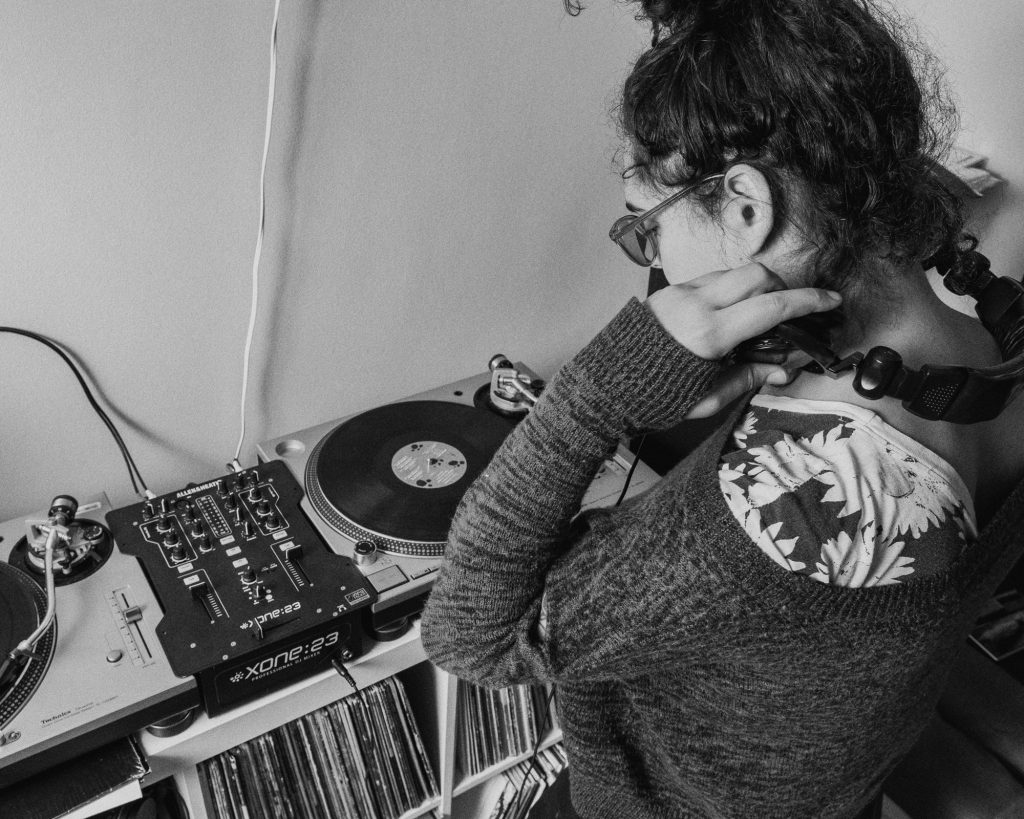
ST: You said you think about the journey. I’ve also talked to other DJs who talk about how there is a story they’re telling in a set, or a narrative. Which I think makes sense for the form because it’s something that develops over time, but do you think about it that way? What does that mean to you?
AZ: I really do think that way from doing so much theater, that’s why my sets are interesting because I studied a sort of narrative structure for so long. I think of DJing as a time-based performance in a lot of ways, where it’s a journey and there are these moments of climax and moments of conflict and moments of flow. But for me, it’s not necessarily about putting a subject matter on it, or any sort of narrative on it; it’s very much what is the forward motion of this. I do think my sets tend to be pretty theatrical. When I played a set in New York the last time—it’s actually recorded so it’ll be on the internet at some point—they were like, “Oh, yeah, this part is so clearly the intermission of your set.” Like an hour in I did a sort of arrhythmic, ambient set that uses chopped up vocals a lot and really calls attention to itself. I feel like it’s moments like that when I feel I’m taking people on a sort of journey. And I think that’s also why I can travel across genres, because flow is important to me. I will always be critiqued on mixing badly. When I was playing at the Berghain complex [legendary techno club in Berlin], I feel like I had this expectation that I’d be a perfect mixer there. But I was like, that’s not me as a DJ ever. [Laughs] I will always be critiqued for stuff because I will go across genres so much all the time. I think that because I have an interest in the theatrical nature of things, it allows me to do that, and it allows me to sort of glue things together.
ST: How do you treat vocals? I feel like in a lot of your sets and music, the vocals are these sort of declarative statements, or an expression of an attitude—that’s my interpretation—in addition to, or rather than, singing about loving to dance. A lot of dance music is singing about dancing. How do you treat vocals, how do you decide when to put vocals into a set, and what do they do for you?
AZ: I always tell myself, “One day I’m going to have a set without vocals,” but it still hasn’t happened. I don’t know if it’ll ever happen. I think vocals are really great, I think they’re grounding it in some sort of reality—especially when you hear something that is being repeated over and over. I come from a poetry background, as well, and I think the use of text—not necessarily to explain something, but more to express something—is really common in that. I really go into a lot of dance music with this idea of repetitive structures and this idea that if we’re hearing a phrase over and over and over, it changes meaning somehow. So I think that, for me, it’s really important to know what text I’m putting forth and knowing what I’m trying to say even if it doesn’t fit in perfectly.
What I’m really attracted to about a lot of techno music and a lot of club music these days is that it’s using voice as instrument as opposed to voice as subject. I feel like I like to play with that. It’s also just another untapped resource in dance music a lot of the time. People think [vocal tracks] put you into reality too much, but I’m like, no, I think it can be really surreal and hearing voices can still be very…this moment. So yeah, I think a lot about text, and text-heavy sets sometimes, but I really like the notion that, okay, I’m playing this acid track after this acid track after this acid track and all of a sudden a Beyoncé vocal comes in—I love the sort of element of surprise with that. Just the idea that these things can come out of nowhere. We can be put in a couple different realities at the same time. That’s also what I like about call-back tracks and stuff. I feel like dance music is so much about referencing [the past] and doing things that are not yet released, and that sort of crossing of those timelines. Like, I love when I can hear a Chicago house track in someone’s set and you wouldn’t even know that was Chicago house by the way somebody played it, but people catch these little things—and I think with vocals you can do that with a wider audience. But I remember being really shook a lot of the time, when I was going into the club and I didn’t even know you could play a bootleg of a sample of a random TLC line over and over. I think I was always really shook by that kind of stuff because that didn’t seem possible to me in a lot of ways, that didn’t seem possible.
ST: The aspect of it being this mainstream pop music in a club setting?
AZ: Yeah! I think that for me, I always talk about my music as being techno but I’m not afraid to play Rihanna. I think I’m less and less interested in that, but I think a lot of people are judgmental if you reference things that are like that. I’m always like, you know, a lot of the music people that [look down on pop music] are playing—if they played this 10 years ago, 15 years ago, people would be saying the same stuff about the vocals they’re using. I think it’s like I grew up in a time different from other people, which is true for all DJs. I always think it’s crazy that younger DJs are playing random Ariana Grande and Miley Cyrus that I was too old for or something when it was coming out—just like, I did not know people were into that. I think it’s both. Just a reference, one sort of moment.
I really gagged because my Boiler Room set opens with this random sample, like an 8-bar loop of a Charli XCX track from her second album or something, and I was like, “It doesn’t sound like that to anybody.” But then two or three people caught it, and I feel like it’s those moments where I’m like, yes! I think it’s the sort of subversion of stuff that seems really always exciting to me. I think showing people that you can listen to top 40 music and it doesn’t have to sound like it is always really exciting. I hope I never lose that in my sets, even if I’m not necessarily playing it all the time. I think there is a time and place for it, but it’s, like, a party. People always take themselves so seriously. It’s all these things, like, all these articles coming out about how forward-thinking this techno producers is because they put one vocal track in the middle of the mix from like five years ago—and it’s always just, like, if you reference one thing it’s artistic, but if you reference more than one thing people are like, I don’t know what she’s doing. [Laughs] I feel like I never want to conform to this idea that a DJ is supposed to sound like this in a certain way because that’s what’s getting rewarded right now.
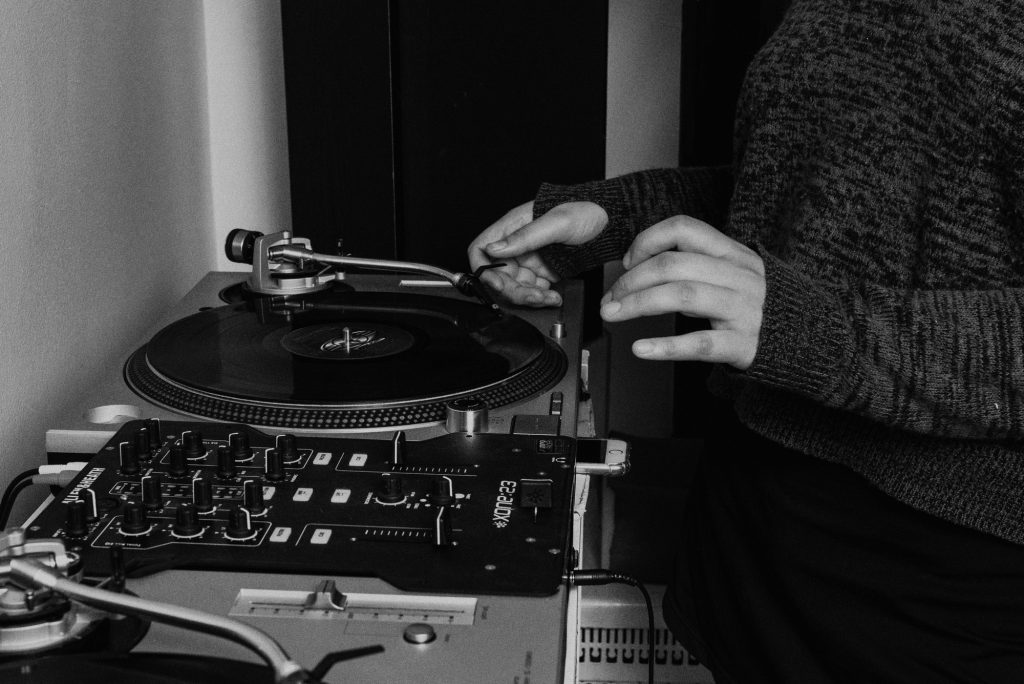
ST: What’s your agenda for your audience—what are you trying to do to them?
AZ: Oh my gosh, what am I trying to do––I always like to think my sets are emotional but not in a way that’s prescriptive. I like to think that someone could really lose themselves in one of my sets. I just really appreciate when people feel like they’re able to do that. And I feel that losing yourself can also be collective. I really love when I’m DJing and it really feels like a community moment with that and it doesn’t really feel like an inward moment. That being said, I do really like when it has that notion of introspection. I think there’s a lot of stuff in music, like melody and rhythm that really have the opportunity to have you experience an emotion, and that can have multiplicity and many things that reading something or watching something doesn’t necessarily make you do just because it’s grounded in so much stuff. I’ve turned to melody a lot more and more—I think the melody is just like an amazing way of being able to tap into emotions in a way that other stuff doesn’t. So I always want people to do that.
ST: Melody as opposed to rhythm or melody as opposed to reading a text?
AZ: I think as opposed to text, yeah. As opposed to using art as a mirror for reality. Doing something that is for a completely different thing. I watched ”Us” the movie for the second time last night and thinking, okay, music in horror movies is very prescriptive, and it can be very, very that. But I think for me, I’m very interested in how melody can be un-prescriptive. I was scoring a play earlier this year and I had this realization like two weeks into the process where I scrapped so much stuff I made because I felt like I was making music that was supposed to sound sad and that’s actually not what’s helpful in this. What’s helpful is melody being able to contrast with the textual. And since this was a play, it was so much about supporting the text. It needs to be something that clashes with it and complicates it rather than this is how you’re supposed to feel with the text. Then I think it’s really effective.
[bandcamp width=350 height=470 album=381527205 size=large bgcol=ffffff linkcol=0687f5 tracklist=false]
ST: When you’re talking about what you’re trying to do to us as the audience and this idea of losing yourself in the music and that being a collective experience, during one of your sets at the Hideout you were changing the tempo a lot with the pitch shift. I thought it was really hilarious. I felt like you were playing this funny joke on us: when we’re in the moment and then suddenly you, like, speed it up or slow it down, so we snap out of it. It made us realize we’re all doing this thing together, when we had to stop for a second because the tempo changed. I think about that moment.
AZ: I always think about one of my friends who really early on was like, “Ugh, I hate when things change tempo,” and having a really adverse reaction to it. And I think for a while I was like, “Oh gosh, I should never do that.” I think it’s a really effective way to change the mood. What I’m thinking when I’m doing it is, “Okay, I need to change this mood and I need to change the tempo.” It can be very obvious if it’s a very slow gradual process, so I think my way to combat that is to make it more obvious and be like, “Okay, we’re going to go really slow for a second and when we’re going back, we’re going back faster.” Almost like a psych-out of being like, “Oh, you think we’re going this way? We’re actually going this way.” So you’re thinking about that moment and then being able to have comfort with the thing you would have been discomforted by. It’s very side-eye emoji, too—we’re in a room dancing and this idea…I don’t know if it’s the sacred and the profane, some poetic theory or some bullshit. [Laughs] It’s this idea that it’s like, you always have to have a bit of both where you have to have this beautiful, religious, sacred experience. If it gets too much like that it gets really chintzy and shit. And then, if you go the other way, it’s so profane and rough and whatever. It’s so messy.
And I think a lot about the sets that are privileged, like at a bunch of these music festivals in Europe are just so sacred and so, “You’re never gonna hear this DJ mess up”—and I’m just like, what is the point? What is the moment of that? There are so many options with DJing and playing two tracks together, and I feel like people really just make it an ordinary experience a lot of the time. Which is not necessarily bad. I definitely think there are people that do a perfect mix from the start through the end, and it’s amazing and really interesting and awesome. Seeing Josey Rebelle play, I feel like she really showed me how messy stuff can be. Because when you’re playing unquantized, old acid tracks, so much of that is so all over the place already that you can’t be so sacred about this.
ST: Yeah. When I listen back to recordings of my own mixes that were live, they often sound worse to me. You lose the moment. So much about DJing is about the moment and being live. The point of it is that it’s ephemeral, starts at night and ends when the sun rises. What’s the trace of DJing, of your mix? How do you archive it in a way that is true to the moment?
AZ: I think for me––it’s funny you say that. When I was in Manchester they recorded my set and I obsess over listening to it, being like, “What the fuck, this is what I sounded like in there?” When I’m listening back, I’m so like, “Uh! What is this?” I think I was obsessing over which cut am I putting out, and I just said, you know what, I’m just putting out the whole thing, because there are so many parts where I’m just like, “Ugh! I don’t know!”
But I think that’s the beauty of archiving stuff—those moments are just stuck in there and that’s how I played. I think that a lot of people will release mixes that don’t necessarily sound like how they play. I’m glad to have access to those recordings because it’s like, what was I thinking and actually doing in the moment and how can I both put this into my own production and how can I also put this into mixes I’m doing in my own home? It’s hard. I’m so critical of my stuff when I listen back to it. I also think when I know I’m going to record, I’m going to play differently…That was the weird thing about Boiler Room, too—it’s this thing simultaneously knowing you’re going to have this mix that’s going to be on the internet and playing it [live], and I think that is what was weird about it. I feel the preparation for that gig was halfway between I’m making a mix and I’m also playing live for people.
ST: How did that affect the live mix for you?
AZ: It’s funny. I planned the first five mixes in a way that I never do in sets. I’ll do the mixes and I’ll be a little more prescriptive with how I’m going to mix something, so I definitely did that. But I think what I found was that I somehow had this notion that I was going to play the best mix of my life, and it was going to be perfect. And then I think after the first mix I was like, I can’t hear anything, I don’t know what’s happening with this. I went through the first five mixes so fast, that I was like, “Fuck—I guess I just have to do what I’m going to do and play how I play and it’s going to be what it is…” I always say I don’t actually think I’m playing well until 45 minutes in, and in the US especially sets are only like an hour tops. And I’ll always just be getting into something before I’m actually in it, so I always appreciate when I have that two hours of time at least. It’s a really surreal experience, and it’s just like driving a train that might go off the tracks at any moment. I’m a really untrustworthy train sometimes—but that’s what’s exciting about it.
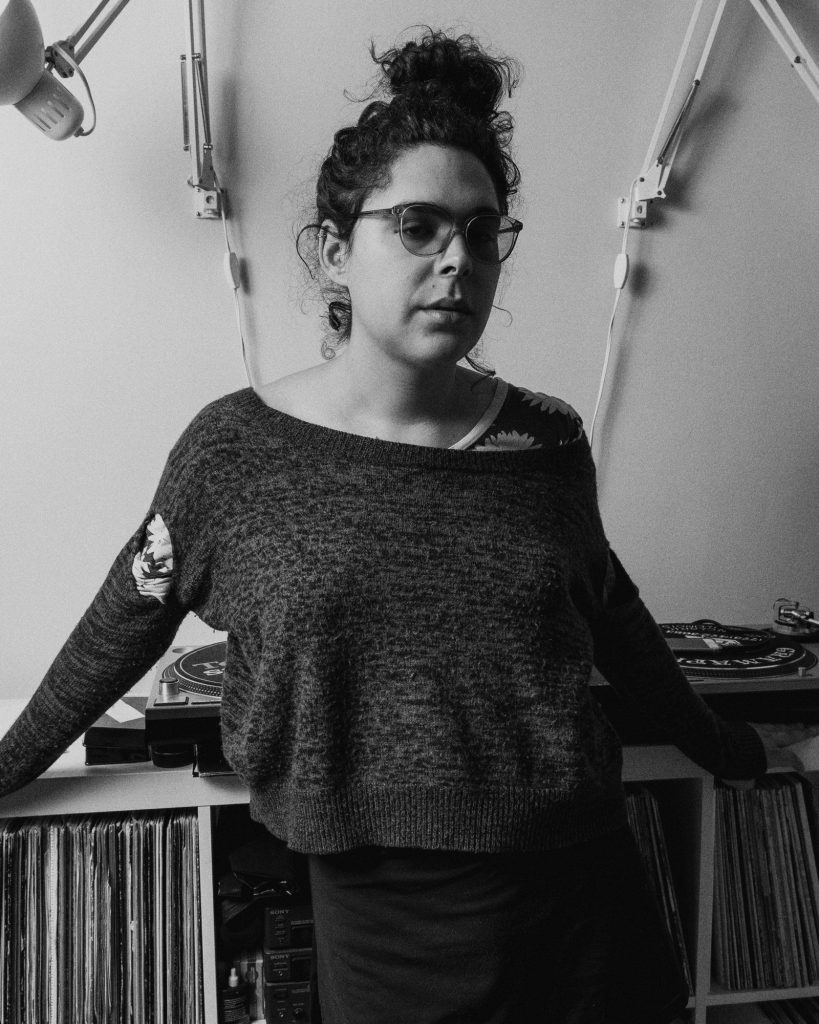
ST: What are you reading right now?
AZ: Oh my gosh! Oh my gosh—it’s actually so embarrassing, if you asked me this two months ago, it would’ve been so much better. But I’m literally reading fucking “Big Little Lies” the book right now. It’s so embarrassing. I was like, I need a beach read but I need to read a basic ass novel. So I’ve been reading that. I was really judging myself before I went to Europe because I had to pack really lightly, so I was going to only bring one book that I didn’t even end up reading the entire time I was there. But I brought “Big Little Lies” instead of “Parable of the Talents” by Octavia Butler. I was like, this is embarrassing. I literally left a fucking amazing sci-fi writer for some trash. But, you know, yeah.
It’s been interesting. I was studying this a lot and I took a lot of classes but wasn’t necessarily a major, but in the performance studies department at Northwestern, which was basically—I never want to say anthropology of performance, but it was sort of the study of performance and contexts that are not meant for, or that you wouldn’t normally consider performance. Half of the department is looking at things like rituals and funerals and weddings and presidential conferences, and looking at the idea of performance and how performance is used in sort of everyday life and studying that. More of what I was studying and looking at was adaptation of novels and short stories and documentaries and taking found materials and putting it into a performance context. For years and years and years and years I could not read novels because of the way I would only be thinking about these really specific styles of adapting things—it’s funny, performance is just a mode, as a way of doing it—and I could not read anything without thinking about it, and I feel like now I’m finally at a point where I can read a novel and I’m not having that experience and I can just read it to read it. It’s been nice. I’m excited about reading just a regular novel, because I feel like I’ve just been reading non-fiction, and I’ve just been getting back into reading novels. I was only watching documentaries and only reading non-fiction.
ST: What kind of non-fiction?
AZ: I read a lot of music history stuff––something that really fucked me up in a good way was ”Emergent Strategy” by adrienne maree brown—that really changed my life. I read that maybe six months ago, and that was really good.
ST: How did it change your life?
AZ: I think I always thought of myself as a community organizer as a DJ, and that kind of empowered me to really think about that even more. But I actually think what’s funny about that book is that I read it with this notion of how it’s going to change my art, and change my practice. But I think more so I was able to heal from an abusive relationship because of things that were said in that book. It showed me the idea of having a balanced lifestyle is actually really important to the work that everyone does, and I feel like I’m someone who doesn’t necessarily prioritize having a balanced life a lot of the time. And just forgetting that social interactions and being able to work on your own relationships, your own self, and working on your own relationship with yourself is actually going to affect things. And it’s so obvious when I say it, but you know, it’s not easy for me. What I’ve been doing lately is rather than I can be only in email world—and I think I feel that I have this notion that if I send 20 emails I’ll have done something productive—but then not work on music stuff––it’s just like, maybe because I have to send 20 emails doesn’t mean I have to do all of [them] in a day and finish everything. Maybe I can just prioritize that one thing and go into another kind of thing will help. I think that book is so much about not being in a capitalist structure, or how to survive the capitalist structure. But I really want to read “Pleasure Activism,” I haven’t read it yet. That’s the next book I’ll start after “Big Little Lies.”
ST: Get your pleasure first, with ”Big Little Lies.”
AZ: Exactly! adrienne maree brown would approve. I’ve also been listening to her podcast a lot, “How to Survive at the End of the World” which is really good. I listen to a lot of podcasts, mostly. I just like, I am not going to be able to hear if I keep listening to techno, so I’ll switch to a podcast. A lot of it is just like, I don’t know, I feel like old as fuck because I do it, but I’m like, yes!
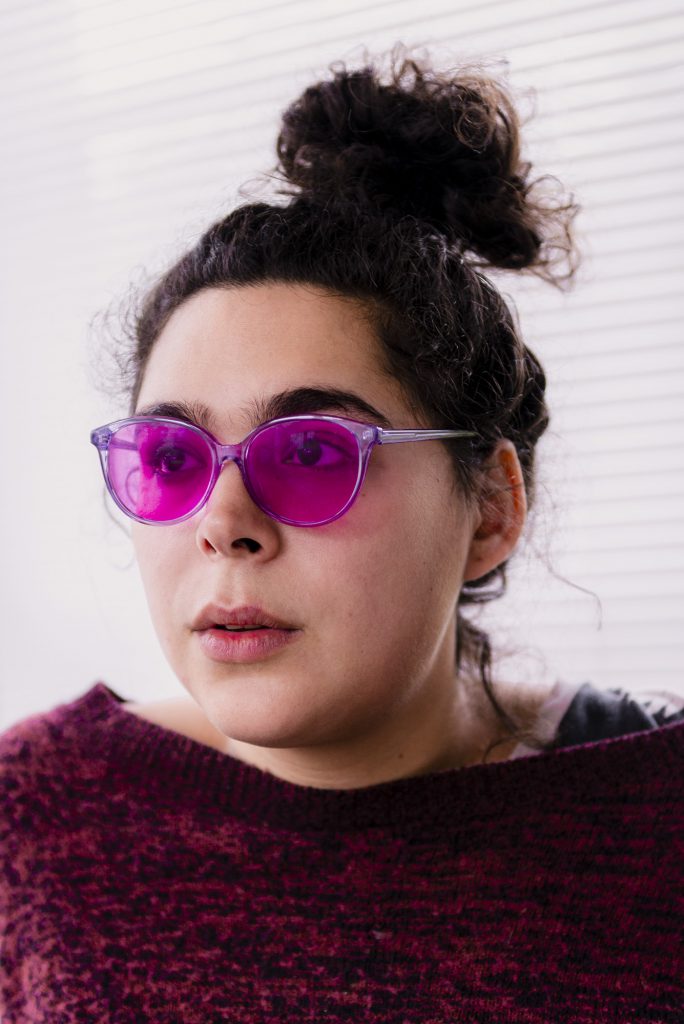
ST: You sort of alluded to how your recent tour in Europe got you to rethink your practice, to understand it in new ways. In what new ways are you understanding your practice?
AZ: I remember someone critiqued me about this when I was like 22 in a class, and someone was like, “All your work has a mania to it.” This was before I transitioned, so I feel like it was because of that. I feel like I had this notion a lot where I would be like, “Oh, I have to be in party mode to play and I can’t live with my own brain because I’m so stressed, and if I’m stressed when I’m playing I’m not going to be able to give what I need to give.” I have to let go a little bit. For me, I really felt the notion of: I play best when I’m really incredibly focused on what I’m doing, but also in a way where I’m not constantly judging myself about that. I think I was judging myself in Europe at the time, like what am I doing? It wasn’t until the end of it and after I did everything I had a sense of calm and it actually makes my playing better. It doesn’t make my playing tranquil or boring, like I thought it would. Even if I’m playing something that’s frantic there can be a sort of peace with it. And I think that is something I’m really trying to take with me from that. Also, I think just presenting things more simply, not being able to feel like I have to do everything in one thing in order to feel like I’m making an impression. Just being like—is this me? My playing will always be me, and I think that I forget that sometimes. You know, I’m glad I put that into words. I don’t think I’ve ever put that into words before, and I’m like okay, yeah.
ST: That’s beautiful. That’s something major to realize. You can just be yourself—you don’t have to be partying.
AZ: I feel like I don’t have to. I feel like what it comes with is just having to play for a bunch of people who have literally never heard me play before. I feel a lot of pressure that there’s some expectation of what I’m going to do. But I just realized I don’t know what that expectation is, I don’t know what they’re wanting to hear. It’s always so scary to play your own tracks. I don’t like playing things from my EP that just came out, it’s a very weird thing. I’m trying to be more okay with it because I know people want to hear stuff from that, and just having the confidence to just be like, “I can play this.” I already made this track. I know that it fits with what I’m doing. I feel a lot of pressure to mix it perfectly, to play it perfectly. When I’m playing one of my tracks, and I mess up, I’m like, “What am I doing, how did I fuck this up!?” But you know, just the notion that I’ll never know what someone’s expectations are. But it’s cute.
Featured Image: Ariel Zetina sits in her sunroom wearing a maroon sweater that matches her rose-tinted sunglasses. Photo by Ryan Edmund.

Starting from the proposition that art-making is world-making, Sasha Tycko combines community organizing and curatorial work with writing, music, and performance. Tycko is a founding editor of The Sick Muse zine and an administrator of the F12 Network, a DIY collective that addresses sexual violence in arts communities. IG: @t_cko. www.sashatycko.net. Photo by ColectivoMultipolar.
